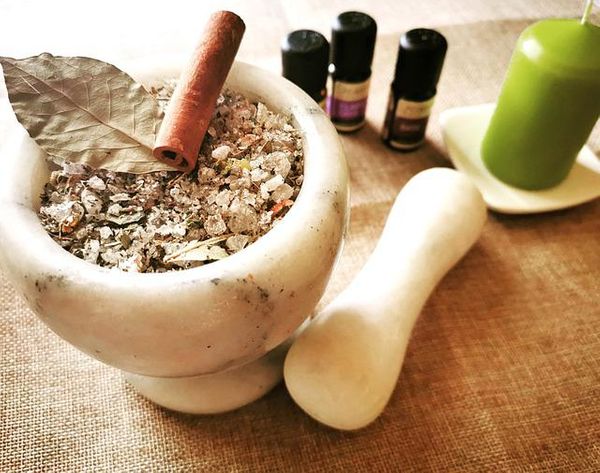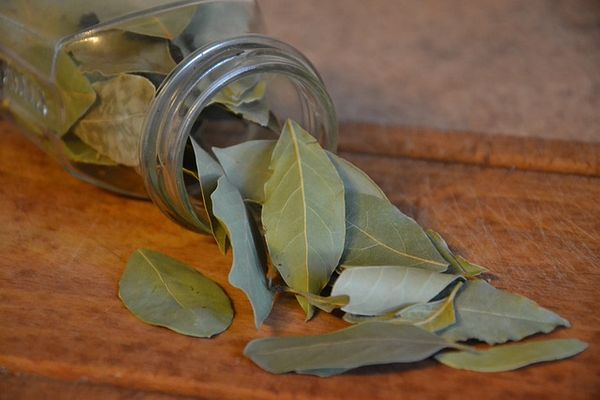Bay leaves, often referred to as bay laurel or sweet bay, are produced by the woody shrub Laurus nobilis, which is indigenous to the Mediterranean region. (Source) They’re known for their subtle aroma and flavor, which comes from their essential oils. They become more flavorful as they age, and that flavor is extracted with steam and heat. (Source)
The leaves have a harsh taste when eaten raw, but they give a meal a rich, herbal, woodsy flavor and scent when they are added to a slow-cooking cuisine, such as soup or stew. The leaves of the evergreen English or cherry laurel plant resemble those of the bay laurel. The two plants are significantly unlike, and the latter could be poisonous if consumed. (Source)
The oval, 3-inch (7.6-cm) long culinary bay leaves are used in cooking. They feature smooth but wavy borders and extensive veining. When bay leaves are dried, their glossy, dark green color changes to a more olive hue. Yes, there are many health benefits of bay leaves –
Also Read: Health Benefits of Coriander: Nutritional Facts & Precautions
1. Bay Leaf Can Control Diabetes

A 2008 study found that taking daily capsules with 1-3 grams of the bay leaf can assist diabetics to regulate their blood sugar and cholesterol levels. This is most likely because bay leaves have polyphenols, which are potent antioxidants. These encouraging findings suggest that bay leaf may help control and perhaps prevent diabetes and other cardiovascular problems. (Source)
2. Bay Leaf Can Help From Wounds
The capacity of bay leaf to lessen inflammation around wounds has been researched. Researchers discovered that bay leaf could speed up wound healing in earlier tests on rats. (Source)

3. Health Benefits of Bay Leaves: May Prevent Kidney Stones
A 2014 study looked into the possibility of kidney stone prevention with bay leaf extract.
The bay leaf was found in the study to have the same anti-urease effects as eight other conventional therapeutic herbs. When out of equilibrium, the enzyme urease can cause a number of gastrointestinal diseases, including kidney stones. However, the study’s researchers recommended that additional studies be conducted to determine how these herbs work. (Source)
4. Bay Leaf Can Help in Cancer Treatment
According to certain research, bay leaves may aid in slowing the development of colorectal and breast cancer cells. (Source) These results, nevertheless, are preliminary, and some of the studies are out of date. Additional investigations involving humans must be done in order to support this notion. (Source)
5. Bay Leaves Possible Effect On Memory
In a 2021 investigation, rats were exposed to bay leaf for five minutes once a day for 22 days in a smoke chamber device. They discovered that it enhanced cognitive impairments and helped with memory formation. Despite the fact that human studies are not always transferable to animals, animal research can nevertheless provide useful information. (Source)
Nutrition And Nutritional Values Of Bay Leaves
According to the National Nutrient Database of the United States Department of Agriculture, one tablespoon (tbsp) of Bay leaves has the following nutrients (USDA). (Source)
- Energy 1310 kj
- Protein 7.61g
- Fat 8.36g
- Cholesterol 0mg
- Carbohydrates 74.97g
- Fibre 26.3g
- Sodium 23mg
- Potassium 529mg
Also Read: Benefits of Black Pepper: Health Facts, Nutritional Value & Side Effects
Side Effects Of Bay Leaves
For the majority of people, bay leaf and bay leaf oil in dietary levels are probably harmless. The complete, intact leaf should not be consumed. Because the leaf cannot be digested, it stays whole as it moves through the digestive tract. This implies that it has the potential to obstruct the neck or puncture the intestines.
Bay leaf could slow the central nervous system down (CNS). When taken with anesthesia and other drugs used before and after surgery, there is a worry that it may slow down the CNS too much. At least two weeks before the scheduled surgery, all medication utilizing bay leaves should be stopped.
Health Views, an online health website covers exclusively on nutrition and nutritional value of all foods – Check out the nutrients here at Healthy Foods.





